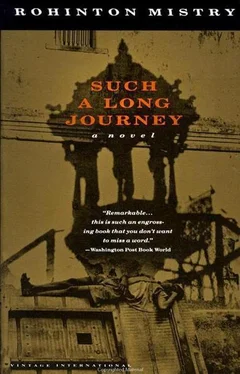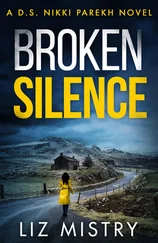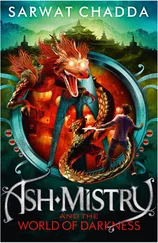‘ Nahi chalaygi! Nahi chalaygi !’ rang out repeatedly, as the morcha approached Khodadad Building. Malcolm, his mukaadam, the labourers and surveyors, downed their tools and lined up at the curb. People leaned out of the office towers, customers and shopkeepers evacuated their shops, and the entire street suspended its business for the morcha.
The marchers drew abreast with the wall. A fresh vitality animated their slogans now. With a captive audience, their steps discovered a renewed bounce, their waving arms extra vigour.
Suddenly, one of the morcha directors signalled the column to a halt with three bongs on Peerbhoy’s paan -vending brass tray. The tray had been selected over numerous other contenders: a hub-cap struck with a tyre iron, Dr. Paymaster’s silver desk bell, the local monkeyman’s drum, the snake-charmer’s piercing flute. All were rejected, for none could compare with the sonorous dignity of Peerbhoy’s tray.
The shining reverberations of the three strokes soared in the air like birds of paradise, shimmering over the marchers’ heads. ‘Brothers and sisters!’ the inspired morcha director called out. He raised his arms to appeal for silence, then repeated, ‘ Bhaiyo aur baheno. ’ A hush settled over the marchers.
‘You are asking: why have we stopped now, before reaching the municipality? And in answer I say to you: what better place than this sacred wall of miracles to pause and meditate upon our purpose? The wall of gods and goddesses. The wall of Hindu and Muslim, Sikh and Christian, Parsi and Buddhist! A holy wall, a wall suitable for worship and devotion, whatever your faith! So let us give thanks for past success! Let us ask blessings for future endeavours! Let us pray that when we reach our destination we will achieve our purpose! Let us pray that in the spirit of truth and non-violence we will defeat our enemies!’
The procession roared its approval, surging towards the wall. The municipal workers stood clear as queues formed before each portrait. At the painting of Zarathustra there was only one person: Dr. Paymaster. Laxmi, the goddess of wealth, commanded the longest line. Genuflections, prostrations, head-bowings, hand-foldings, eye-closings, invocations, supplications, adorations, all followed fervently. Many concluded by leaving a coin or two.
A municipal worker said, to no one in particular, ‘Save your money, yaar, the wall will soon be destroyed.’
Wall destroyed! The words percolated through the morcha and trickled through the crowds of bystanders. Wall destroyed?! Disbelief turned to indignation, then to outrage that surged through the congregation and swelled into a tidal wave, making the ground tremble as it galloped for the shore.
Impossible! said the wave with ten thousand mouths, raging and rumbling. The wall of gods and goddesses cannot be broken! We will see that not one finger is raised against the deities! We will protect them with our blood if need be!
The situation was fast deteriorating, and the morcha directors immediately summoned Malcolm. ‘Is it true,’ they asked him, ‘that your men are to break down this wall and destroy the gods and goddesses?’
Malcolm had never learned to prevaricate. He nodded briefly. The morcha howled, the tempest raged and threatened — there was no misunderstanding, the satanic scheme had just been confirmed! But the morcha directors requested silence with a single mournful stroke of the brass gong.
‘My friend,’ said the chief director to Malcolm. ‘What you are saying is foolish. It is foolish because it cannot be done. Here is a place of prayer and worship. Look for yourself. Neither man’s wish nor government’s orders can change that. Look at the pictures of Brahma, Vishnu, and Shiva. Look at Rama and Sita, Kali Mata, Laxmi, Jesus Christ, Gautama Buddha, Sai Baba. For every religion this place is sacred.’
The morcha cheered, the bystanders applauded, and the chief director gained momentum. ‘See Nataraja and Saraswati, Guru Nanak and St Francis of Assisi, Zarathustra and Godavari Mata, and all the paintings of mosques and churches. How can you demolish such a holy place?’ He spied the tiny silver crucifix on a chain around Malcolm’s neck. ‘You are a good man. Fall on your knees before this wall. Utter the Lord’s Prayer, say a Hail Mary, confess your sins. Pray for a miracle if you like, but do not attempt to destroy the wall.’
‘Really, I don’t want to,’ said Malcolm uncomfortably, finding his voice at last, and the people cheered. ‘But,’ he continued, as the cheers died, ‘my men and I don’t make the decisions. We just follow the orders of the bosses at the municipality.’
The municipality! That loathsome name again! The morcha, like a maddened monster sprawling in the road, seethed with renewed anger and hatred. They harass us in our neighbourhood without water supply! Without sewers! With gutters that stink! With bribes that empty our pockets and fill theirs! And now they want to destroy our sacred wall! ‘ Nahi chalaygi! Nahi chalaygi ! Municipality ki dadagiri nahi chalaygi !’ the cry rang out, again and again, from every throat.
The loyal mukaadam felt he had to take Malcolm’s side. He shouted over the clamour, ‘We are also religious people! But we are poor, just like you! If we don’t follow orders, we lose our jobs! Then how to feed our wives and children?’
The other labourers rallied round the mukaadam. That’s right! You have jobs for us if the municipality kicks us out?’
Hydraulic Hema, tall and powerful, wearing her best and tightest garments, stepped forward from the House of Cages delegation. She snatched a tread-cutting tool from one of the tyre retreaders and brandished it before her. In her sandpaper voice she addressed Malcolm, the mukaadam and his men. ‘You see that painting? Yellamma, Goddess of Prostitutes?’
Malcolm and his mukaadam nodded, gulping nervously.
She swung the tool, describing a circle in the air below the mens’ bellies. The sun glinted on the short, nasty blade. ‘You spoil that picture, you break any part of this wall, and I promise you, I will make hijdaas out of you all,’ she said, once again lunging blood-thirstily with the tread-cutter.
The men lurched backwards, involuntarily covering the fronts of their striped shorts and dhotis. They were too embarrassed to retaliate. Silence, golden as the sound of Peerbhoy’s brass tray, hovered over them for a few brief seconds.
Easing the black velvet prayer cap away from his forehead, Gustad hurried homeward after Ghulam’s taxi disappeared in the traffic. He was anxious to change out of his dugli and leave for the bank. But why all these big crowds and strict police bundobust, he wondered. And the street noisy as a festival day, like Ganesh Chaturthi or Gokul Asthami, packed from pavement to pavement.
He reached the gate of Khodadad Building in time to see Hydraulic Hema flourish the razor-sharp instrument. Malcolm spotted him: ‘Gustad! Gustad!’ he waved, then his voice was drowned by the uproar following the grisly threat, as the offended workers reached for crowbars and pickaxes. The policemen shuffled their feet and gripped their lathis, making a show of alertness. The sub-inspector, taking no chances, asked his jeep driver to radio the police station for urgent reinforcements.
Gustad craned impatiently — what was Malcolm doing in the middle of a rowdy morcha ? One moment he saw him, the next he had disappeared. But he did not want to venture through the thick of it in search of him. Later, when things calmed.
Читать дальше












